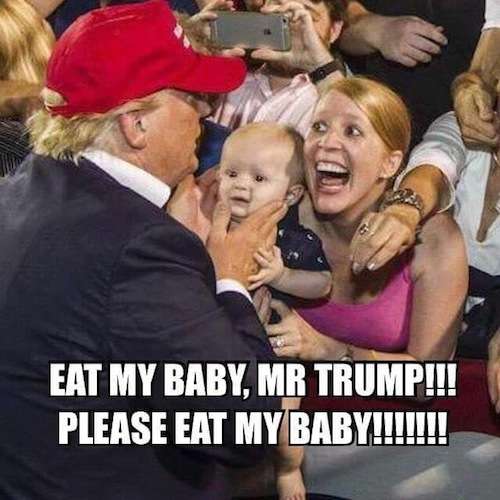Two Kinds of Social Conservatism
Whether Donald Trump is "socially conservative" depends on what sort of social conservatism you mean.


This morning Donald Trump met in Manhattan with hundreds of conservative Christians. The Washington Post reports that the group was not entirely united. His speech received a standing ovation, and some prominent attendees have embraced the TV star's presidential campaign; but others present have denounced him with words like "a candidate whose worldview is greed and whose god is his appetites." One participant, radio host Eric Metaxas, told the Post he just wants Trump to understand that "he has to take seriously that constituency, people who are social conservatives."
Which raises a question: Just what exactly is a social conservative anyway? It is widely understood (though perhaps not widely enough) that "socially liberal" can mean anything from live-and-let-live tolerance to an intrusive effort to regulate people's unhealthy habits. Maybe "socially conservative" can be unpacked a bit too. Maybe a phenomenon like Trump, a man sometimes described as a right-wing extremist and sometimes as a social moderate, requires us to unpack it.
As it happens, NBC just published a long and thorough look at Trump's supporters and their worldviews. Two passages seem particularly relevant to this question. Here's one:
Trump's support also challenged assumptions about Republican views on social issues. Research by the University of Pennsylvania's Institute for the Study of Citizens and Politics suggests Trump's voters tended to be more supportive of abortion rights than other Republicans at a time when many Republican politicians have moved further to the right on that issue. An NBC News|SurveyMonkey poll of 1,007 registered voters who support Trump in late February found that 45 percent of respondents identified as "pro-choice."
The article goes on to note that while Trump has done well with self-described evangelical Christians, this advantage disappears when you look specifically at evangelicals who attend church every week. All this supports the idea of Trump as a social moderate.
But then there's the other passage:
The RAND PEPS surveys in December/January and in March that found Trump supporters to be more economically liberal than other Republicans also found that they were more likely to show signs of resentment toward minorities and immigrants based on questions designed to measure these qualities. Trump also did better with voters who showed stronger signs of white ethnocentrism, a trait based on how favorably respondents rated whites relative to other racial and ethnic groups….
Pew Research conducted an online survey in April and May that produced similar results. Republican respondents who believed immigrants threaten American values rather than strengthen society, that Islam was more likely to encourage violence than other religions, and that America's trend toward majority-minority status was bad for the country, were much more likely to have warm feelings for Trump in comparison to other Republican voters.
If you want to stave off a "majority-minority" America, and especially if you want to do this because you think it threatens your culture's values, then you are trying to conserve central elements of your society. You are, in the most literal sense of the phrase, being socially conservative. But this is a conceptually different sort of social conservatism than the pro-lifers were espousing. Evangelicals, by definition, want to convert people; this second sort of so-con is afraid his community will be converted into something else. Those impulses certainly can go hand in hand, but they don't have to.
Some of the Christians who listened to Trump today won't have much trouble supporting his campaign. Others either will refuse to back him or will fall in line only because they think Hillary Clinton is worse. Which path they take will have a lot to do with whether they mix that second type of social conservatism with the first.
